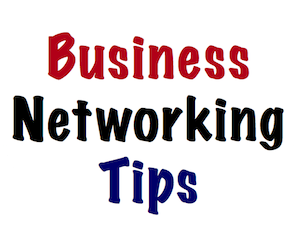Before you attend networking events, think about the true purpose of them. There is a reason it’s called networking – it is not a social event. So if there is alcohol available, make sure you limit your intake, or it might be best to avoid it altogether. Also consider your industry and target customers before deciding to attend an event – is it right for your business.
Why attend the event? – Write down what you want to achieve from the event.
- Is it to meet someone specific?
- New job opportunity?
- Improve your communications skills
- Increase personal confidence?
Whatever it may be, chances are, those attending will be wanting to do the same.
Networking is about being genuine and authentic, building trust and relationships, and seeing how you can help others.
Networking starts with your current contacts. Networking doesn’t necessarily mean actively pursuing making new relationships. Cultivate those you have already and invest in those relationships first.
Preparation, preparation, preparation! – Plan your questions in advance, so you ask the things you really want to know.
1. Approach the event with the right attitude. A negative attitude is likely to attract negativity.
2. Prepare a one-minute ‘elevator pitch’ about yourself and your product/service.
If a potential customer does ask you about your product or service, be ready with an easy description of your company. Before the event, create a mental list of recent accomplishments, such as a new client you’ve landed or project you’ve completed. That way, you can easily pull an item off that list and into the conversation.
Resist the urge to arrive late. It’s almost counter-intuitive, but showing up early at a networking event is a much better strategy than getting there on the later side. As a first attendee, you’ll notice that it’s calmer and quieter – and people won’t have settled into groups yet. It’s easier to find other people who don’t have conversation partners yet.
Be yourself. The more real you can be, the more people will remember you. Next, be interested in what others are doing. If you can help them get what they want, you’re a lot more likely to form lasting relationships. Most deals aren’t made in the first few meetings. It’s about the long-term relationship. Connect people you believe could benefit from each other, and don’t hold back with what you can do or offer to help others.
Starting a conversation. Is as easy as asking a simple question or paying compliment. Consider the following:
- “What brings you to this event?”
- “Have you attended one of these events before?”
- “What are you looking forward to?”
- “Have you tried the meatballs?”
- “That’s a beautiful tie.”
- “What a lovely dress.”
- “Its hot in here isn’t it?”
Understand their needs. It’s far more important to understand their needs before you tell them about your needs. Your goals should not be on the forefront of your mind. You’re trying to develop a relationship with someone, which means you should be thinking about them. It’s your job to understand the people in your network, where they are coming from, and what’s important to them.
Ask easy questions. Don’t wait around the edges of the room, waiting for someone to approach you. To get the conversation started, simply walk up to a person or a group, and say, “May I join you” or “What brings you to this event?” Don’t forget to listen intently to their replies. If you’re not a natural extrovert, you’re probably a very good listener – and listening can be an excellent way to get to know a person.
Ask open-ended questions in networking conversations. This means questions that ask who, what, where, when, and how as opposed to those that can be answered with a simple yes or no. This form of questioning opens up the discussion and shows listeners that you are interested in them.
Ditch the sales pitch. Remember, networking is all about relationship building. Keep your exchange fun, light and informal – you don’t need to do the hard sell within minutes of meeting a person. The idea is to get the conversation started. People are more apt to do business with – or partner with – people whose company they enjoy.
Prepare a specific topic for each discussion. Do some research on the company, industry or career of your contact. Put together a list of questions, including some that deal specifically with their background. Ask for advice on your job search, and the names of other professionals who would be beneficial to connect with. Think about ways you might help, like suggesting other contacts they might find useful.
Share your passion. Win people over with your enthusiasm for your product or service. Leave a lasting impression by telling a story about why you were inspired to create your company. Talking about what you enjoy is often contagious, too. When you get other people to share their passion, it creates a memorable two-way conversation.
No one is immune from networking. Embrace it, find the fun in it, and it will serve you well.
Don’t forget to Smile. It’s a simple rule of engagement. By smiling, you’ll put your nervous self at ease, and you’ll also come across as warm and inviting to others. Remember to smile before you enter the room, or before you start your next conversation. And if you’re really dreading the event? Check the negative attitude at the door.
Look for opportunities others might miss. Sometimes the most valuable networking you can do is within your company. It’s a great opportunity to meet senior managers and their spouses and to support a cause the company considers worthy. Or perhaps a senior executive from your firm is giving a luncheon speech to a local organization. Not only can you learn from this presentation, but you’ll be providing him or her with support and building a bond for the future. You’ll also be adding new contacts to your network.
Be a conversationalist. Some people who dislike networking may overcompensate by commandeering the discussion. Don’t forget: The most successful networkers (think of those you’ve met) are good at making other people feel special. Look people in the eye, repeat their name, listen to what they have to say, and suggest topics that are easy to discuss. Be a conversationalist, not a talker.
Listen more than you talk! Be a good listener. People love to talk about themselves, and you can’t learn about the other person if you’re doing all of the talking. Ask plenty of questions. Most enjoy talking about themselves. Be the person who wants to know more about new contacts. Nod, smile, and do everything possible to leave a favorable impression.
Don’t expect anything. The fact that you reached out and made contact with someone does not put them in your debt. No one is required to “pay you back.” Instead of approaching networking with the goal of gaining favors, try reaching out with curiosity. Contact interesting and relevant people and see what happens. Some of them will respond and some of the won’t. Learn about the people that follow up. Find out what makes them interesting and how you can help them — and don’t expect anything in return.
Remember to follow up. At the end of the meeting, ask your contact if he or she will refer you to other people who may be helpful. Try to keep the appointment under thirty minutes and, at the end of that time, give your contact the option of concluding the meeting. It’s often said that networking is where the conversation begins, not ends. Get in touch within 48 hours of the event to show you’re interested and available, and reference something you discussed, so your contact remembers you. Always thank contacts warmly for their time and help. Send a thank you note.
Remember that you’re never too old or successful to network. Don’t think that executives or others in authority positions are uninterested or unreachable. Many senior executives are delighted to be contacted and want to share the knowledge they’ve acquired over the years. Because of their seniority, they may be isolated and appreciate the chance to impart wisdom or learn something new from a prospective graduate. And when you reach a pinnacle of your own career, remember to keep your network fresh and alive. It’s fun, plus you never know when it may come in handy.
Business cards. “They’re an effective way for you to leave your name behind so that people remember who you are.” However, we all know the person who shoves his/her business card down your throat immediately. It’s a turnoff, and not a very polite way to engage a new contact. Offer your business card after having a conversation — and asking for the other person’s first. As you hand one over, tell the other person what you are going to do – ‘I will send you some information about…’, or…’I will give you a call and we can arrange to meet.’ Take their card and make sure you write a note on it to remind you what you said you would do for them.
Say the person’s name: “People like to hear their own name” So when you meet someone, use his name in conversation. Doing so makes the other person feel more comfortable, like you really know him and he knows you.
Call those you meet who may benefit from what you do and vice versa. Express that you enjoyed meeting them, and ask if you could get together and share ideas.
Don’t Forget Social Media . Social media are powerful tools for professional networking when used judiciously. So be selective, and use virtual contacts to supplement, not supplant, face-to-face meetings. Social networking is deeply reinforced by an in-person connection.
Networking can be a powerful tool if you know how to focus your networking efforts strategically and understand that the practice is ultimately about building relationships.
What’s your best networking tip? What networking tricks are in your toolkit? What advice do you have for creating a ‘viral’ network?






